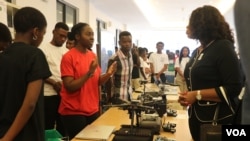Public universities in Malawi have ordered all students sponsored by USAID to drop out or seek other sources of funding if they want to remain in school. This follows the 90-day freeze on U.S. foreign assistance recently announced by President Donald Trump.
However, Malawi’s government says it is working to ensure that students can continue their education.
USAID has provided financial support to thousands of students in several Malawi universities, including the Lilongwe University of Agriculture and Natural Resources, Mzuzu University, Kamuzu University of Health Sciences, and the Malawi University of Science and Technology or MUST.
James Mphande, the communications manager at MUST, said the U.S. foreign aid freeze is a big blow to several USAID-funded projects the school was implementing.
“And what it means now is that everything has been suspended,” he said. “So, if we were developing a curriculum, we can’t proceed. If we had some outreach activities, we can’t proceed. If we were in the process of making some procurements, we can’t proceed.”
He said some sponsored students may face the impact next semester.
“Fortunately, we are in the middle of a semester. So, probably fees or support for this semester was already sorted out. But for the upcoming semesters or years, it means the students will have to look elsewhere for support or they risk withdrawing,” Mphande said.
However, Patience Yamikani Chakwana, a beneficiary of USAID at MUST, told VOA that she is already feeling the impact.
Chakwana, a first-year student in business information technology, said the foreign aid suspension was imposed before students received money for their daily upkeep.
“It was really unexpected. It was, like, we have just started school after a week, then we are getting the news,” she said. “At the time, we didn’t have the money, and the pocket money had not been given. … I heard the news while I was in class. I didn’t know what to do. That was the only hope I had.”
Chakwana said USAID was paying for her tuition and accommodation, as well as giving her money for groceries and the internet connection for her mobile phone.
She said she now survives on money she borrows from friends.
Jessie Kabwila, Malawi’s minister of higher education, said the aid suspension is discouraging, but the Malawi government is working to find other sources to help students.
“We have engaged local partnerships that are in the private sector to see how they can help us. We have also engaged international partners. For example, we have got a standing agreement with the Republic of Morocco. We have also engaged the Czech Republic, and we will be engaging others, too,” Kabwila said.
Alexander Kude, deputy director for the Commonwealth Students Association, told VOA that the U.S. foreign aid suspension should be a wake-up call for developing countries to start investing more in education and reduce overdependence on foreign aid.
“Look, the budget that the United States of America uses to fund us through USAID, it’s just a percent of their money and budget. If you look how much that is and where they get it from, why not stand alone and do it ourselves?” Kude said.
The Trump administration says it imposed the 90-day freeze to review USAID spending and make sure it aligns with U.S. policy and interests. The freeze will extend through April 20.




